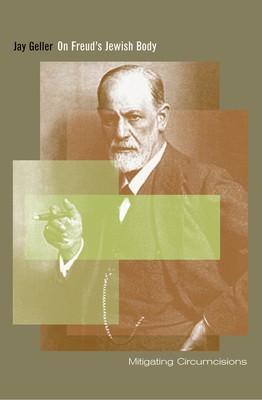
- We will send in 10–14 business days.
- Author: Jay Geller
- Publisher: Fordham University Press
- ISBN-10: 0823227820
- ISBN-13: 9780823227822
- Format: 15.2 x 22.6 x 2 cm, minkšti viršeliai
- Language: English
- SAVE -10% with code: EXTRA
Reviews
Description
Through a symptomatic reading of Freud's corpus, from his letters to Fliess through the case of Little Hans to Moses and Montheism, this book demonstrates how "circumcision"--the fetishized signifier of Jewish difference and source of knowledge about Jewish identity--is central to Freud's construction of psychoanalysis.
Jay Geller depicts Freud as an ordinary Viennese Jew making extraordinary attempts to mitigate the trauma of everyday antisemitism. He situates Freud at the nexus of antisemitic, misogynistic, colonialist, and homophobic discourses, both scientific and popular. These held in place the double bind of post-Emancipation and pre-Shoah Viennese Jewish life: the demand for complete assimilation into the dominant culture, accompanied by the assumption that Jews were constitutionally incapable of eliminating their difference. Incarnate in the figure of the circumcised (male) Jew, this difference haunted the Central European cultural imaginationand helped create, maintain, and confirm Central European identities and hierarchies. Exploring overlapping layers of gender, sexuality, ethnicity, and race in identity construction, theories of trauma, fetishism, and writing, Geller looks at Freud's representations of the Jewish body--especially circumcised penises and their displacements onto noses. He shows how Freud reinscribed the virile masculine norm and the at once hypervirile and effeminate Jewish other into the discourse of psychoanalysis.
EXTRA 10 % discount with code: EXTRA
The promotion ends in 23d.20:08:18
The discount code is valid when purchasing from 10 €. Discounts do not stack.
- Author: Jay Geller
- Publisher: Fordham University Press
- ISBN-10: 0823227820
- ISBN-13: 9780823227822
- Format: 15.2 x 22.6 x 2 cm, minkšti viršeliai
- Language: English English
Through a symptomatic reading of Freud's corpus, from his letters to Fliess through the case of Little Hans to Moses and Montheism, this book demonstrates how "circumcision"--the fetishized signifier of Jewish difference and source of knowledge about Jewish identity--is central to Freud's construction of psychoanalysis.
Jay Geller depicts Freud as an ordinary Viennese Jew making extraordinary attempts to mitigate the trauma of everyday antisemitism. He situates Freud at the nexus of antisemitic, misogynistic, colonialist, and homophobic discourses, both scientific and popular. These held in place the double bind of post-Emancipation and pre-Shoah Viennese Jewish life: the demand for complete assimilation into the dominant culture, accompanied by the assumption that Jews were constitutionally incapable of eliminating their difference. Incarnate in the figure of the circumcised (male) Jew, this difference haunted the Central European cultural imaginationand helped create, maintain, and confirm Central European identities and hierarchies. Exploring overlapping layers of gender, sexuality, ethnicity, and race in identity construction, theories of trauma, fetishism, and writing, Geller looks at Freud's representations of the Jewish body--especially circumcised penises and their displacements onto noses. He shows how Freud reinscribed the virile masculine norm and the at once hypervirile and effeminate Jewish other into the discourse of psychoanalysis.


Reviews